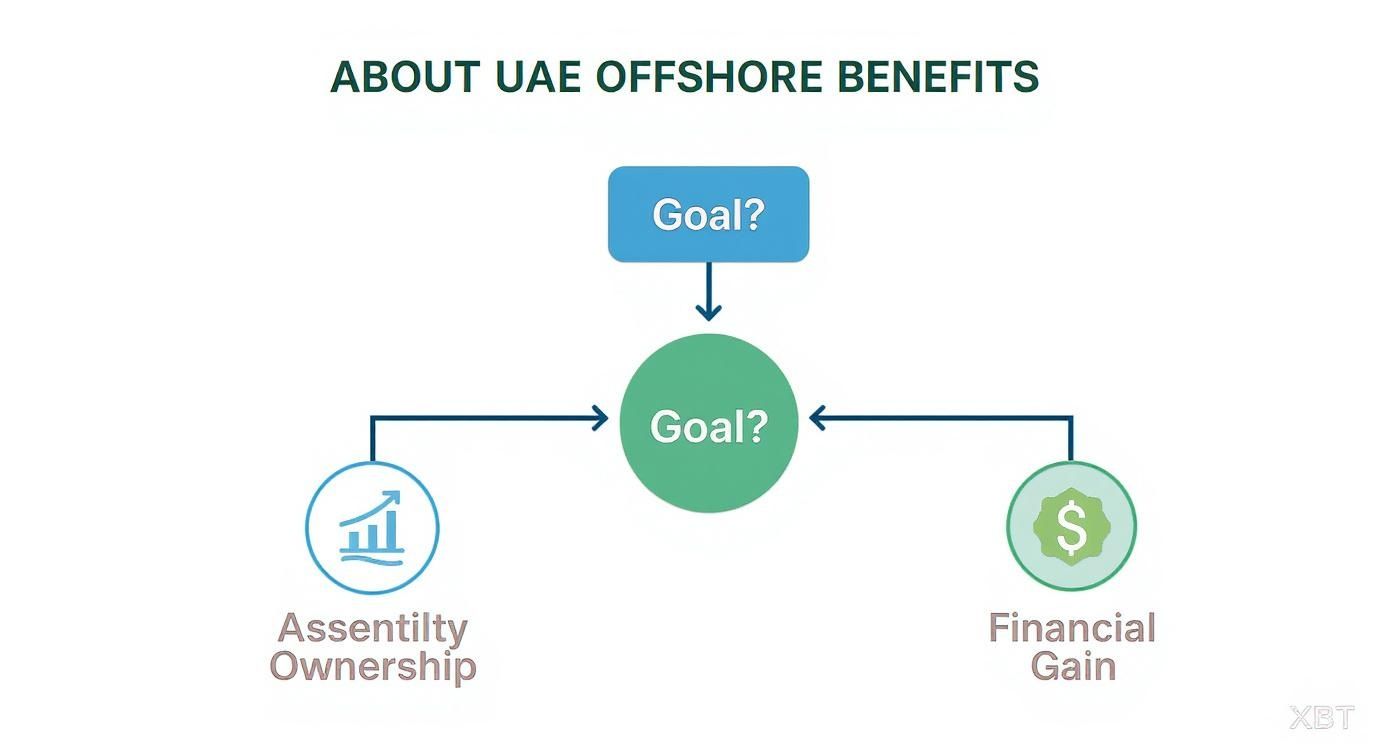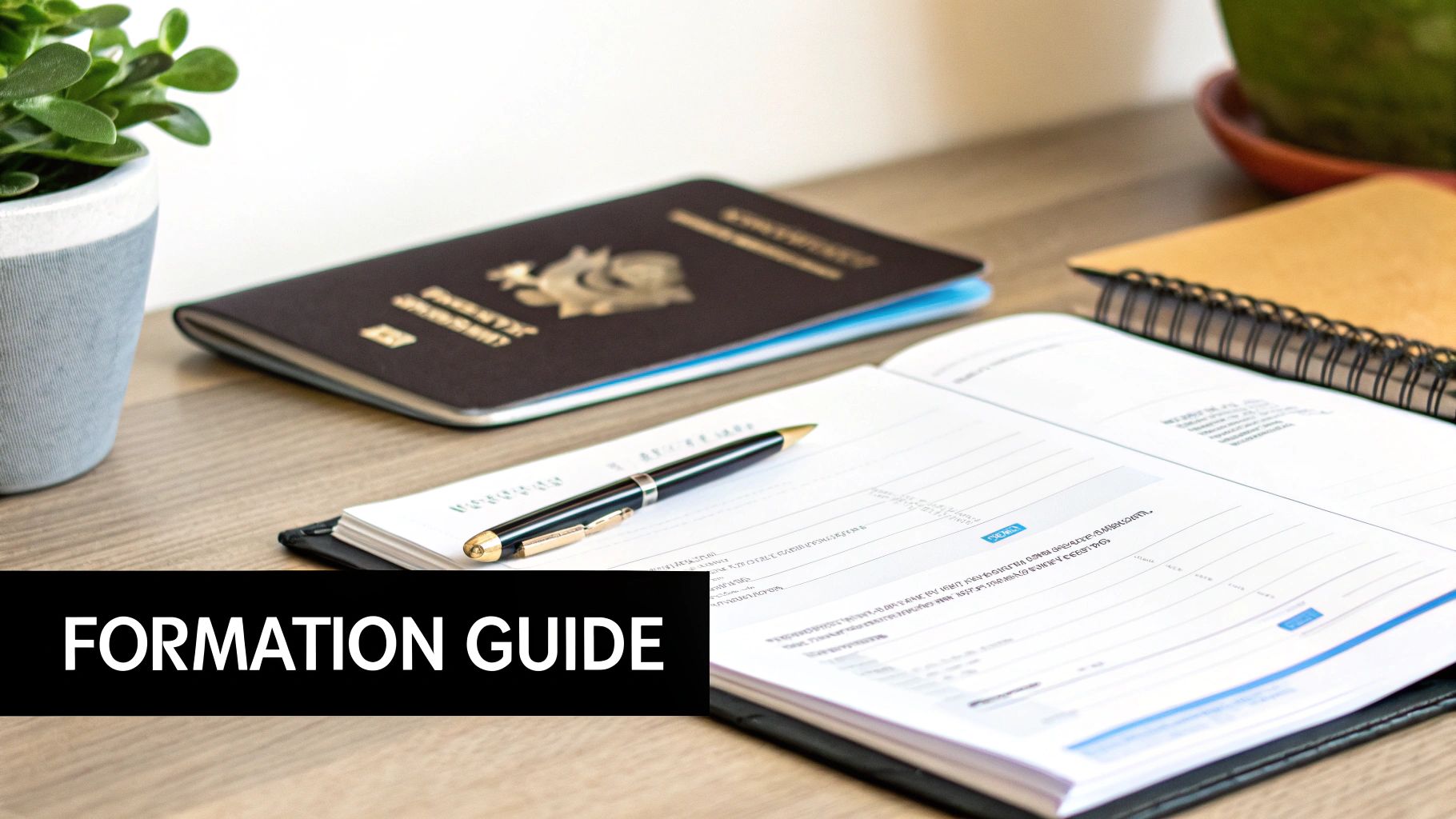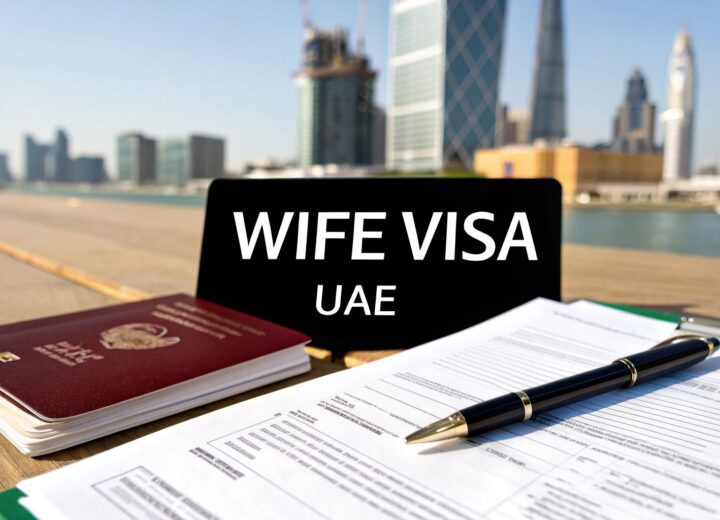So, what exactly is an offshore company in the UAE? Put simply, it’s a legal business set up in a specific jurisdiction, like JAFZA or RAK ICC, but designed almost exclusively to do business outside the United Arab Emirates. It’s a popular structure for international entrepreneurs because it offers huge benefits like 100% foreign ownership, tight confidentiality, and some very attractive tax advantages.
Understanding the Core Concept of a UAE Offshore Company
Think of it like giving your business a 'global passport' that’s based in the UAE. This passport lets you operate all over the world with incredible flexibility and security, all while being legally anchored in one of the world's most stable economic hubs. That’s really the heart of what a UAE offshore company provides.
This setup is completely different from mainland and free zone companies, which are built to operate inside the UAE market in one way or another. An offshore entity is specifically tailored for business activities that happen beyond the country's borders.
Think of it as a strategic base camp for your global operations. It’s legally registered and recognised in a reputable jurisdiction but exists almost entirely to function on the international stage, not within the local UAE economy.
Key Purpose and Functionality
The main job of a UAE offshore company isn't to sell products or services to people in Dubai or Abu Dhabi. Instead, it’s all about international goals. Shrewd entrepreneurs and investors use this powerful tool for a few key reasons:
- International Trade: It makes cross-border transactions a breeze. You can invoice clients anywhere in the world and manage global supply chains without ever needing a physical office in the UAE.
- Asset Protection: It’s a fantastic way to hold valuable assets. This could be anything from real estate and intellectual property (like patents or trademarks) to shares in other international companies, all kept within a secure, legally protected structure.
- Global Investment: Many use it as a holding company to manage a portfolio of international investments. It provides a centralised and tax-efficient vehicle for looking after your wealth.
Distinguishing Offshore from Onshore
The biggest difference comes down to where you can operate. A mainland or free zone company gets a trade licence so it can do business locally. An offshore company, on the other hand, is a non-resident entity. This means it can’t rent physical office space in the UAE or apply for visas for its staff.
Its real value is in its legal status and the financial perks that come with it. By setting up an offshore company, you get access to the UAE's world-class banking system, solid legal framework, and favourable tax environment for all your global activities—while keeping everything completely confidential. It's a structure that paves the way for serious financial efficiency and freedom for any international entrepreneur.
The Real Benefits of a UAE Offshore Setup
Setting up an offshore company in the UAE isn't just a box-ticking exercise; it's a strategic play for any serious international entrepreneur. The upsides go way beyond a simple checklist, offering real-world advantages in financial efficiency, operational flexibility, and long-term security. When combined, these benefits create the perfect launchpad for managing a global business.
You have to understand that the very DNA of offshore companies in the UAE is built for global operations. They are a different breed from onshore and free zone companies. Their game is asset holding, international trading, and global business—but they can't operate within the UAE itself.
Think of them as 'paper companies'—a term used because they aren’t issued a business licence to trade locally. Their power is entirely outward-facing: 100% profit repatriation, no corporate tax on income earned outside the UAE, and rock-solid privacy for the owners.
Complete Control Over Your Assets and Profits
One of the first things you'll appreciate is the total command you have over your business. Forget jurisdictions that force you into local partnerships; a UAE offshore company gives you 100% foreign ownership. That means every decision is yours to make.
This complete ownership goes hand-in-hand with another massive perk: 100% capital and profit repatriation. You can move your money in and out of the UAE whenever you want, with zero restrictions or currency controls. This freedom is crucial—it means your earnings are always liquid and ready for your next global move.
A Fortress for Your Financial Well-being
Beyond just ownership, a UAE offshore structure acts as a powerful shield for your wealth. The entire legal framework is geared towards high-level asset protection, drawing a thick line between your personal wealth and your business liabilities.
A huge advantage of a UAE offshore setup is the enhanced security it provides, which is a key part of broader strategies for protecting assets from lawsuits.
This legal separation gives you a few layers of security:
- Liability Shielding: It keeps your business risks contained. If the company faces legal or financial trouble, your personal assets are kept safe and sound.
- Succession Planning: An offshore company is an incredibly effective tool for estate planning, making it simple to pass assets on to your heirs smoothly.
- Confidentiality: UAE offshore jurisdictions take privacy seriously. The names of company owners and shareholders are not on any public register.
This level of privacy is really the foundation of the offshore structure. It gives business owners peace of mind, knowing their financial affairs are kept private and shielded from prying eyes.
A Highly Favourable Tax Environment
Let's be honest, the tax efficiency of an offshore company is a major reason people are interested. These companies are perfectly placed to take advantage of the UAE's tax rules, especially when it comes to income generated outside the country.
Yes, the UAE now has a corporate tax, but it’s really aimed at mainland and free zone businesses that operate inside the UAE.
Offshore companies, by definition, do their business internationally. Because of this, any income they earn from outside the UAE is generally not hit by corporate tax. This makes for an incredibly efficient way to manage global profits. For a full picture of the local tax system, our guide on how to register for corporate tax in the UAE is a great resource. This tax advantage lets you keep more of your profits and plough them back into growing your global business.
Choosing Your Jurisdiction: RAK ICC vs. JAFZA
Picking the right jurisdiction for your UAE offshore company is a bit like choosing the right foundation for a house. It’s a foundational decision that will shape everything that comes after. The two main players in this space are the Ras Al Khaimah International Corporate Centre (RAK ICC) and the Jebel Ali Free Zone Authority (JAFZA).
While both offer serious advantages, they’re built for very different purposes. Your choice will directly impact your company's costs, how flexibly you can operate, and even how it’s perceived on the world stage.
This isn't about which one is "better" overall, but which one is the perfect fit for your business. A trading company that lives and breathes logistics will have completely different needs than a consultant protecting their intellectual property or an investor managing a global portfolio.
The Prestige of JAFZA Dubai
When you hear JAFZA, you think of a global powerhouse. Established way back in 1985, it's one of the oldest and most respected free zones in the world, and it carries the weight of Dubai's reputation for business excellence.
Its biggest draw is its direct link to the Jebel Ali Port, one of the busiest shipping hubs on the planet. This makes a JAFZA offshore company an incredible asset for businesses in international trade, shipping, and logistics. Just being registered there lends your company instant credibility.
But that prestige comes with a higher price tag. Both the initial setup and the annual renewal fees for a JAFZA offshore company are noticeably more expensive than in RAK. The regulatory environment is also famously strict, demanding tight compliance—which is great for its reputation but can mean a more involved setup process.
The Flexibility and Value of RAK ICC
Over in Ras Al Khaimah, RAK ICC has quickly carved out a name for itself as a modern, affordable, and incredibly flexible jurisdiction. It has become the go-to for entrepreneurs and investors whose main goals are holding assets, offering consulting services, or managing international investments, rather than moving physical goods.
The main attractions here are affordability and simplicity. Setup and renewal costs are significantly lower, putting it well within reach for startups and solo entrepreneurs. The rules are modern and business-friendly, giving you a lot of freedom in how you structure your company. You can dive deeper into its specific advantages in our guide to RAK offshore company formation.
RAK ICC is often seen as the agile and pragmatic choice. It's ideal for holding companies, special purpose vehicles (SPVs), and consulting firms. It delivers all the core benefits of a UAE offshore structure—confidentiality, tax efficiency, and asset protection—without the premium price tag.
To get a clearer picture, this decision tree can help you see if your main goal is controlling assets or maximising financial gains.

This visual guide breaks down the decision-making process, linking your core business goals to the distinct benefits of a UAE offshore setup.
A Direct Comparison: RAK ICC vs. JAFZA
To make the right call for your offshore company, you need to understand the practical differences. Let’s lay out the key factors that really matter to business owners.
RAK ICC vs JAFZA: A Feature Comparison
| Feature | RAK ICC (Ras Al Khaimah) | JAFZA (Dubai) |
|---|---|---|
| Primary Use Case | Asset holding, consulting, international investments, and intellectual property. | International trade, logistics, shipping, and holding companies needing high prestige. |
| Setup & Renewal Costs | Generally lower and more cost-effective for entrepreneurs and SMEs. | Higher initial and annual fees, reflecting its premium status and location. |
| International Reputation | Strong and growing, known for modern regulations and flexibility. | Excellent and long-established, globally recognised as a top-tier jurisdiction. |
| Bank Account Opening | Widely accepted by UAE banks with a straightforward process. | Highly regarded by banks, often leading to a smooth account opening experience. |
| Regulatory Framework | Modern, flexible, and designed for ease of doing business. | Robust and stringent, with a strong emphasis on compliance and due diligence. |
| Shareholder Privacy | High level of confidentiality with no public register of directors or shareholders. | Very high level of confidentiality, upholding Dubai's strict privacy standards. |
So, what's the bottom line? The best jurisdiction depends entirely on your business model. If your operations are tied to global trade and you want the prestige that comes with a Dubai entity, JAFZA is an outstanding choice. But if your focus is on cost-effective asset management, consulting, or investment holding, RAK ICC provides a powerful and flexible solution that offers fantastic value.
How Offshore Companies Fuel the UAE's Economy
It’s easy to think of offshore companies in the UAE as entities that exist in a bubble, separate from the local economy. But that view misses the bigger picture. In reality, their collective presence sends powerful ripples through the nation's financial landscape. They are a core part of the UAE's master plan for economic diversification and its ambition to become the world's go-to financial hub.
These international business companies (IBCs) aren't just names on a register; they are magnets for significant foreign direct investment (FDI). Every time an offshore company is set up, it requires professional support. This creates a thriving ecosystem of high-skilled jobs in legal, accounting, corporate administration, and financial advisory roles. This demand for top-tier expertise strengthens the UAE's professional services industry, attracting the best global talent.
The offshore sector isn't an isolated island; it's a powerful engine for economic growth. By drawing in global capital and talent, it reinforces the UAE's reputation as a stable, secure, and forward-thinking place to do business.
This is a very deliberate strategy to move the economy away from its traditional reliance on oil. By championing a world-class offshore environment, the UAE is building a sustainable, knowledge-based economy that thrives on international trade and investment, securing its prosperity for the long haul.
The Economic Ripple Effect
The contribution these companies make goes far beyond their registration fees. Think about it: each entity needs a registered agent, legal advisors for structuring, and accountants to stay compliant. This network of essential services creates a vibrant professional scene, offering high-value employment and fostering a truly competitive business environment.
Beyond that, the capital flowing through these offshore structures often finds its way into the wider UAE economy. Owners and directors frequently visit, spending money in the hospitality and tourism sectors. The robust business environment is also boosted by participation in major regional events, like the Seamless Middle East, which further weaves the nation into the fabric of global commerce. This influx of capital and activity supports a whole range of sectors, showing that the offshore industry's impact is both direct and indirect.
A Look at Future Growth and Job Creation
This economic impact isn't just a snapshot of today; it's a cornerstone of the UAE's future. The sector is set for some serious expansion, driven by intense international interest and the nation’s own ambitious goals.
Projections show that the UAE's offshore industry is on track to create nearly 83,000 skilled jobs over the next five years (2025–2030). The sector’s economic contribution is expected to climb to $7 billion (Dh25.7 billion) by 2030—that's a massive 46% increase from where it is now. This really highlights its growing strategic importance in the country's economic diversification. You can find more insights on the job market growth in this sector.
This anticipated growth explains why the UAE continues to refine and promote its offshore jurisdictions. The country's leadership gets it: a thriving offshore sector means a stronger, more resilient, and globally competitive economy. It’s a clear signal to international entrepreneurs that the UAE isn't just a place to register a company—it's a long-term partner in their global success.
Your Step-by-Step Offshore Formation Guide

Setting up an offshore company in the UAE might look intimidating at first, with its own world of legal jargon and specific procedures. But when you break it down, it’s really just a series of manageable steps. This guide will walk you through the entire process, from your first decisions right up to the final incorporation.
The system is built for efficiency, but getting it right comes down to careful preparation and playing by the rules. Bringing a specialist on board from day one isn't just about convenience; it’s a strategic move. It helps you dodge costly mistakes and avoid long delays, ensuring your international business is built on solid ground.
Step 1: Selecting Your Registered Agent and Trade Name
First things first, you need to choose a registered agent. This isn't optional—it’s a mandatory requirement in the UAE. Think of your agent as the official link between your company and the offshore authority. They’re the ones who will handle all the paperwork and make sure you stay compliant with local regulations.
At the same time, you'll need to pick a trade name for your new company. It has to be unique and follow the naming rules of your chosen jurisdiction, whether that's RAK ICC or JAFZA. A common rule is that the name must end with "Limited" or "Ltd." to show its legal status.
Your registered agent will run a check to see if your preferred name is available and help you reserve it, clearing the way for the official application.
Step 2: Compiling and Submitting Essential Documents
Once your agent and name are sorted, it’s time to gather your documents. The exact list can differ slightly depending on the jurisdiction, but the core requirements are pretty standard. This stage is crucial—any mistake here can bring the whole process to a standstill.
Here’s a look at what each shareholder and director typically needs to provide:
- Passport Copies: Clear, colour copies of valid passports are a must for identity verification.
- Proof of Address: You'll need a recent utility bill or bank statement (usually less than three months old) to confirm where each person lives.
- Bank Reference Letter: Some authorities might ask for a letter from each shareholder's personal bank to show they have a good financial history.
- Detailed Business Plan: A straightforward summary explaining what your offshore company plans to do is often required.
An experienced business setup partner is invaluable here. They not only ensure your documents are in perfect order but also manage the entire submission process, liaising directly with the authorities to ensure a smooth and swift approval.
Step 3: Navigating Compliance and Finalising Incorporation
After your application is in, it goes through a strict due diligence check. UAE authorities are serious about maintaining a clean and reputable financial environment, so following global compliance standards is non-negotiable.
This involves detailed KYC (Know-Your-Customer) and AML (Anti-Money Laundering) checks. These rules are in place to confirm the identity of the business owners and the legitimacy of the business activities, effectively preventing illegal financial activities. A good partner can help you prepare for this, making sure all your information is transparent and complete.
Once you pass the due diligence stage, the offshore authority will issue your Certificate of Incorporation, Memorandum of Association, and other official company documents. And just like that, your offshore company is legally established.
The last big step is opening a corporate bank account, which is much easier with expert help. If you're heading down this path, our guide on how to open an offshore company and bank account offers more practical advice. The UAE's commitment to its offshore sector is only growing; by 2025, it's expected to invest around $990 million in offshore exploration, highlighting just how important it is to the economy.
Let Us Guide Your UAE Business Setup
Trying to figure out the right way to launch a business in the UAE can feel overwhelming, especially when you're looking into complex structures like offshore companies. That's where we step in. Our job is to cut through the noise and make your company formation journey as smooth as possible, whether you’re aiming to capture the local market or expand globally.
We specialise in the full range of business setup solutions here in the Emirates. Think of us as your navigators—your goals determine our strategy, not the other way around. We'll handle the paperwork and the procedural hurdles, freeing you up to focus on what really matters: getting your business off the ground and growing it.
Why Partner With Us?
Choosing the right partner from day one gives you a massive advantage. We’ve built our entire service around providing everything you need under one roof, covering every single aspect of establishing and running a company in the United Arab Emirates. Our team is here to give you practical, cost-effective solutions that are a perfect match for what you want to achieve.
Here’s a snapshot of what we do best:
✅ Specialists in Mainland Company Formation in Dubai, Sharjah & Abu Dhabi
✅ Specialists in Freezone Company Formation across the UAE
✅ Specialists in Golden Visa on Property and Investor Visa
✅ Specialists in Corporate PRO Services and Attestation Services
✅ 24/7 Support Service – Always here when you need us
✅ Cost-Effective Business Setup Solutions tailored to your needs
✅ Enjoy UAE Tax Benefits for International Entrepreneurs
We offer much more than just a registration service; we offer a genuine partnership. With our 24/7 support, you'll never feel like you're on your own. We're always here to answer your questions and help you tackle challenges as they pop up. Your peace of mind is our top priority.
Ready to take the next step on your business journey? Let our experience be your guide.
📞 Call Us Now: +971-54-4710034
💬 WhatsApp Us Today for a Free Consultation
Frequently Asked Questions
When it comes to offshore companies in the UAE, a few key questions always come up. Let's tackle some of the most common ones we hear from entrepreneurs, giving you the straightforward answers you need to move forward with confidence.
What Is the Main Purpose of a UAE Offshore Company?
Think of a UAE offshore company as a legal tool designed specifically for international business. Its primary job is to let you manage business activities that happen completely outside the United Arab Emirates.
It’s a popular vehicle for entrepreneurs and investors who need to handle global trade, hold assets like international property or intellectual property, or manage investments from a secure and well-regarded base. The big draws are 100% foreign ownership, major tax advantages on profits made abroad, and strong confidentiality for the company’s owners. Just remember, the one thing these companies absolutely cannot do is conduct business inside the UAE itself.
Can I Get a UAE Residence Visa with an Offshore Company?
That's a definite no. Setting up an offshore company won’t make you or your staff eligible for a UAE residence visa. These entities are built from the ground up to be non-resident structures. They don’t come with a physical office, and they can’t support employees within the country.
If getting a UAE residence visa is a top priority for you, you’ll need to look at setting up in either a UAE mainland or a free zone jurisdiction. Our team are experts in this field and can walk you through the best options for your visa goals, whether that's an Investor Visa or even one of the Golden Visa pathways.
An offshore company is a tool for international financial management, not a pathway to residency. For living and working in the UAE, an onshore (mainland or free zone) setup is the required route.
Is Opening a Bank Account for an Offshore Company Difficult?
While it’s not exactly a walk in the park, opening a corporate bank account for a UAE offshore company is very much possible with the right professional help. It involves a detailed due diligence process because UAE banks follow strict global compliance rules, including tough KYC (Know Your Customer) and AML (Anti-Money Laundering) checks.
What this means in practice is that you'll need to supply detailed documents about your company's ownership structure, identify the ultimate beneficial owners (UBOs), and clearly explain what the business will be doing. This is where working with an experienced consultant like us makes a huge difference. We already have strong relationships with the top UAE banks and know exactly what they're looking for, which seriously improves your chances of getting the account opened quickly and smoothly. We cut through the red tape so you can get access to the UAE's world-class banking system without the usual headaches.
Navigating the setup of mainland, freezone, or offshore companies requires deep local knowledge. At PRO Deskk, we provide specialised, end-to-end support for all your business formation and visa needs, ensuring a smooth entry into the UAE market. Let us handle the complexities so you can focus on growth.





